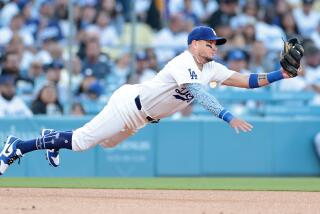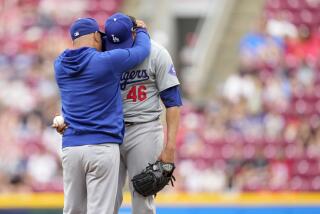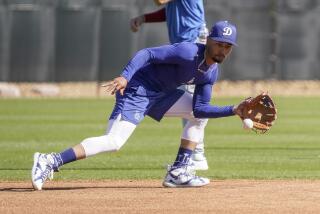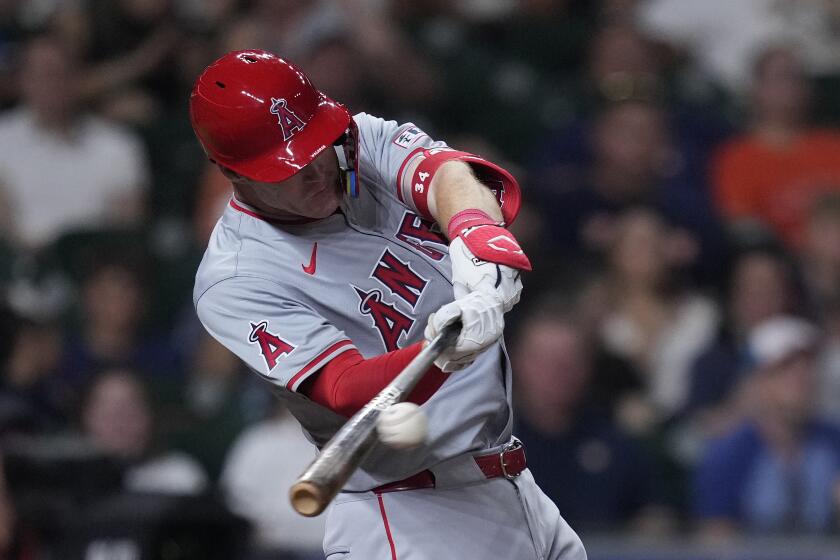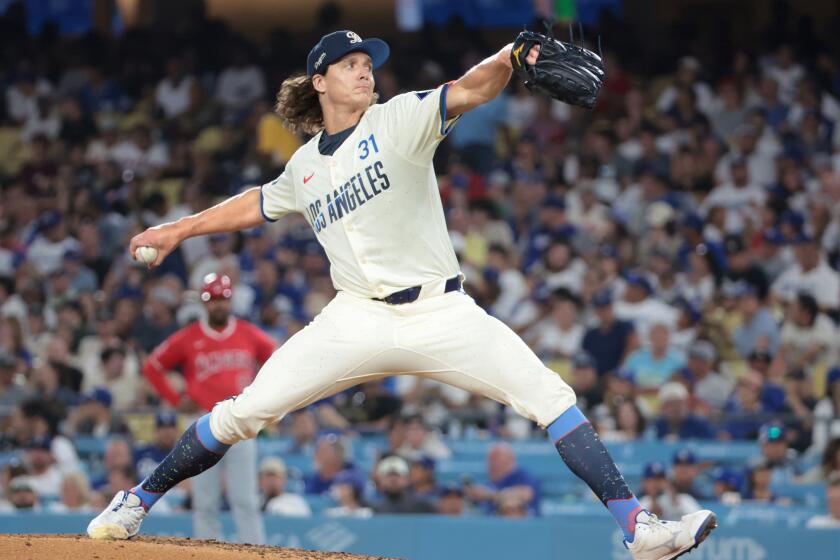Yasiel Puig, Eddie Oropesa: In Dodgers camp they’re perfect match
PHOENIX — They dress side by side in the Dodgers’ spring training clubhouse, the hot prospect and the old pitcher, worlds apart, inseparably linked.
The hot prospect, Yasiel Puig, crisply drapes a uniform across the muscled frame of a fullback. The old pitcher, Eddie Oropesa, slowly climbs into a uniform with a softening body that hasn’t appeared in a major league game in nine years.
Puig is a promising outfielder who was illustriously signed out of Cuba last summer for $42 million. Oropesa was also signed last year, to a job that has no title, no guarantees, and pays minor league peanuts.
Puig has a future as the centerpiece of the Dodgers’ resurgence into Latin America. Oropesa has a past that includes 19 professional teams and a career major league earned-run average of 7.34.
Yet this morning they arrive at Camelback Ranch together, and they will drive home together, and, in between, with every step Yasiel Puig takes, Eddie Oropesa will be there.
When Puig leaves the clubhouse for morning workouts. Oropesa will walk out with him. When Puig practices bunting, Oropesa will be standing to his side. When Puig takes batting practice in a cage, Oropesa will help him pick up the balls. When Puig runs out to left field to shag fly balls, Oropesa will run to right field to do the same.
When someone asks Puig a question in English, Oropesa will translate. When someone gives Puig an instruction he neither buys nor understands, Oropesa will explain and enforce.
When the day ends, they might have dinner together, and if they do, they will take turns paying. When night comes, they will finally separate, and only then, and only for a few hours, will their vastly different lives actually be different.
Puig will return to his rented house and his girlfriend and his video games. Oropesa will return to his tiny room in a Hampton Inn and wait for the call.
It will come from Dodgers player development director De Jon Watson, and it is always the same call.
“How is he doing? How is he adjusting? How can we help?”
If spring training is indeed a time of rebirth, then perhaps the most compelling sight at Camelback Ranch is of two most disparate Dodgers coming into the new season as twins.
Puig, 22, needed a baby sitter. Oropesa, 41, needed a final triumph in a game that once broke his heart. It was a match made in the imagination of Watson and scouting director Logan White, who arranged for the pairing late last summer when they realized that Puig’s rough edges could risk not only the Dodgers’ huge investment, but their foreign-market credibility.
“It’s about cultural assimilation,” says Watson. “We needed someone to help Puig grow.”
When Puig was signed in June, he was so unaware of American baseball, he didn’t know the Dodgers’ colors were blue and white. He had not played in the Cuban league in more than a year as punishment for an earlier attempt to defect. Despite an oversized contract that the Dodgers handed him as a statement for all Latin American prospects, he remained, by most accounts, lonely and confused.
Oropesa knew the feelings. As a 22-year-old Cuban pitcher, he defected in full uniform by leaping a fence behind home plate before a game in Buffalo, N.Y. His wife and family were punished, prevented from leaving Cuba for three years. His potential star career began with a distracted start from which it only scarcely recovered, as he ended it with an 8-4 record over four major league seasons.
“What Puig is going through now, the same thing happened to me 20 years ago,” Oropesa says. “I want him to learn from me.”
When White found Oropesa, he was occasionally helping Latino prospects while giving youth baseball lessons in Miami. Oropesa knew it would be difficult leaving his wife and three children to spend at least a season following Puig around, but he and his family agreed he had no choice.
“Baseball was my life, it was what I did,” Oropesa says. “This was another chance.”
When Oropesa found Puig, the kid was a mess. Puig was used to playing an easygoing, amateur Cuban brand of baseball. During his early days in the Arizona rookie league and for Class-A Rancho Cucamonga, he would sometimes engage friends in the stands during games, he wouldn’t always run hard, and once mimicked an opposing manager who was arguing with an umpire.
“He was too much, his attitude was too much, he had to learn everything,” Oropesa says.
Oropesa moved in with Puig and immediately began teaching him the nuances of everything from restaurants to clubhouses.
“He was like a little kid, getting that kind of money, going around talking too loud,” Oropesa says. “And when somebody on the team tried to help him he would say, ‘No, in Cuba, I do it this way.’ You don’t say that here. You play their way. You change.”
Puig had an .830 OPS in 14 games in Rancho, a brief sign of his potential power and bat speed. This winter he struggled in the Puerto Rican league, yet, with Oropesa living with him, he continued to mature. The Dodgers are crossing their fingers — when they’re not using them to dial up Oropesa — in hopes that Puig makes big strides this summer, probably at double-A Chattanooga.
“I felt a lot of pressure when I signed,” Puig says through Oropesa’s translation. “But now my attitude is different, I know I need to do everything the right way. Eddie helps me with that.”
In return, at least this spring, the old pitcher is back in the big leagues, and that is seemingly reward enough. While Puig has been celebrating the purchase of a Mercedes, Oropesa was in the locker room marveling this week at something far more compelling — his own Dodgers name plate.
“I’m like, oh, hey, that’s me,” he says, the old pitcher laughing, the hot prospect listening.
twitter.com/billplaschke
More to Read
Go beyond the scoreboard
Get the latest on L.A.'s teams in the daily Sports Report newsletter.
You may occasionally receive promotional content from the Los Angeles Times.
